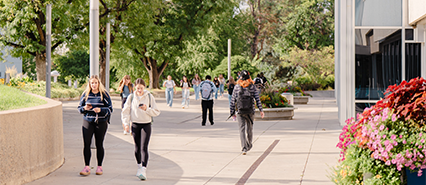CBASE grant brings three postdoctoral researchers
Release Date: March 05, 2018
CSU-Pueblo STEM grant brings added benefit of talented postdoctoral researchers
PUEBLO – As part of a five-year, $6 million grant from the U.S. Department of Education to increase the number of Hispanic and first generation, low-income students earning degrees in STEM (science, technology, engineering, mathematics), Colorado State University-Pueblo has hired three post-doctoral researchers, Dr. Trung Duong, Dr. Indrani Bhowmick, and Dr. Elizabeth Peterson, who have proven to be not just exceptional researchers, but role models and mentors as well. The first part of the grant included the hiring of postdoctoral researchers, who all joined CSU-Pueblo in late spring of 2017.
In 2016, CSU-Pueblo was awarded a $6 million grant over the next five years to establish its Communities to Build Active STEM Engagement (CBASE) Program. CBASE integrates curricular, co-curricular, and programmatic initiatives to increase enrollment, retention, and graduation rates in STEM fields among Hispanic, low-income, and first generation college undergraduate students. CSU-Pueblo was one of only two Colorado schools, and the only four-year institution, to be awarded funds from the H-S-I STEM and Articulation Program. Community College of Denver was the other Colorado recipient.
“Post-doctoral researchers are more commonly found at larger universities,” said CBASE Director Dr. Brian VandenHeuval. “Their presence at CSU-Pueblo helps introduce our students to cutting-edge research from recent Ph.D. graduates, helps promote research productivity from our research teams, and provides our students with fantastic mentors.”
In January, CBASE Engineering post-doctoral researcher Dr. Trung Duong won the Best Paper Award at the 8th IEEE Annual Computing and Communication Workshop and Conference in Las Vegas, Nev. (http://ieee-ccwc.org/) as the lead author on DUHO “Image Segmentation based on Unseeded Region Growing on Superpixels.” Before joining CSU-Pueblo, Duong was a research faculty member at the Center for Advanced Infrastructure and Transportation at Rutgers University. He led the robotics team in research activities of the Long-Term Bridge Performance program funded by the Federal Highway Administration, U.S. Department of Transportation and the Bridge Resource Program funded by the New Jersey Department of Transportation. The product of his group, RABITTM(Robotic Assisted Bridge Inspection Tool), has gained some interest national-wide. His primary roles were in the integration of robotic systems and various NDE technologies, such as acoustic/seismic, electrical, electromagnetic and vision, and development of hardware and software components for various manual and robotic systems. Duong earned his master’s and doctoral degrees in mechanical and aerospace engineering at Oklahoma State University. He brings to CSU-Pueblo his expertise and experience in mechatronics, robotics, embedded systems, computer vision, and machine learning to students in the CBASE community.
The second CBASE biology postdoctoral researcher Dr. Elizabeth Peterson teamed up with student research fellow Hugh E. Long, Fountain, on the paper, “Experimental protocol for using Drosophila as an invertebrate model system for toxicity testing in the laboratory.” The paper was recently accepted to the Journal of Visualized Experiments. This project exemplifies the goals of CBASE and exceptional faculty-mentor collaboration in the pursuit of scholarly work. Peterson grew up in rural North Jersey in a traditional Sicilian-American family. A proud first generation college student (Ithaca College, 2014), she worked as an undergraduate student in two labs: a yeast genetics lab and an ecology lab. In 2016, she earned her Ph.D. at SUNY-Albany with a research program that studied the implications of anthropogenic stressors (e.g. climate change and pollution) on behaviors that are necessary for individual fitness and species survival.
Chemistry postdoctoral researcher Dr. Indrani Bhowmick joined CBASE in April 2017. An inorganic and material chemist, she uses colorimetric sensors to detect toxic molecules/anions using Coordination Chemistry and hybrid materials. Her research with the CBASE undergraduates is focused on applied based colorimetric cyanide sensor using simple inexpensive coordination complexes. She is working with four motivated undergraduate students Cameron Collins, Pueblo, Sean Regalado-Love, Pueblo, Nicholas Richards, Henderson, N.V, and Andrew Pacheco, Pueblo. Cameron presented his research achievements with Indrani at the 2017 Rocky Mountain Regional ACS Meeting held in Loveland, Colorado.
Bhowmick has a diverse experience of research and education in three different continents with students, researchers and collaborators from diverse background. Born in India, she earned her bachelor’s and master’s degrees at Kolkata, India in 2009. After that, she obtained her doctoral degree in inorganic magneto-chemistry from University of Bordeaux (France). Before coming to Pueblo, she was a postdoctoral researcher for three years at Colorado State University Fort Collins.


